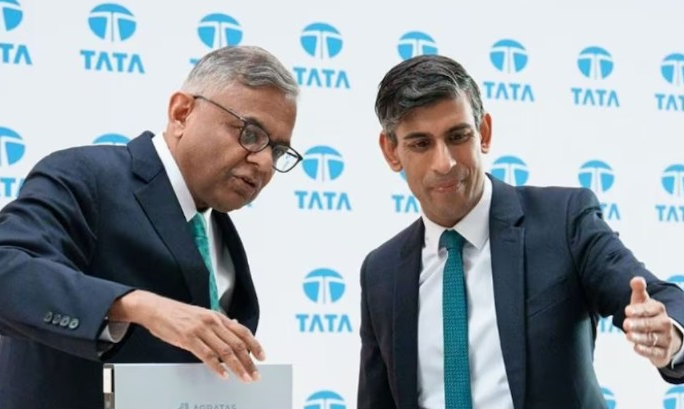Tata to invest £1.25 bn in UK steel industry; British PM Rishi Sunak calls it "big day for UK steel"
16 Sep 2023 12:29:51
London, Sept 16: In a historic development, the United Kingdom government on Friday announced a joint investment package with Tata Steel worth 1.25 billion pounds. It also includes a government grant of 500 million pounds, for the country's largest steelworks in Wales that will help protect thousands of jobs and boost the British economy.

"This investment will modernise and secure a more sustainable future for the UK steel industry. It will also protect thousands of skilled jobs in the long-term and help grow the economy," he said.
Tata Steel and the UK government have announced a joint agreement on a proposal to invest in state-of-the-art electric arc furnace steel making at the Port Talbot site with a capital cost of 1.25 billion pounds, inclusive of a grant from the government of up to 500 million pounds, the company said in a statement.
"The agreement with the UK government is a defining moment for the future of the steel industry and indeed the industrial value chain in the UK," said Tata Group Chairman N Chandrasekaran, who had been working with the government in developing a "transition pathway" for sustainable steelmaking in the UK.
The government's grant has been dubbed as one of the largest British government support packages in history and a "defining moment" for the country's steel industry.

As part of the agreement, the Indian steel giant is expected to invest GBP 1.25 billion, including the government grant, in a new electric arc furnace and related facilities for greener steel production at Port Talbot in South Wales, currently the UK's largest single carbon emitter.
Reacting on this development, British PM Rishi Sunak said, "A big day for UK steel. We've agreed a joint £1 billion investment with @TataSteelLtd to save thousands of British jobs and secure the future of the steel industry in Wales. This follows the £4 billion investment we secured from @TataCompanies in July to create 4,000 jobs."
A big day for UK steel 🇬🇧
— Rishi Sunak (@RishiSunak) September 15, 2023
We've agreed a joint £1 billion investment with @TataSteelLtd to save thousands of British jobs and secure the future of the steel industry in Wales.
This follows the £4 billion investment we secured from @TataCompanies in July to create 4,000 jobs. https://t.co/2XdrXWhOTP
"It's a testament to the strength of our manufacturing sector, which is now 8th in the world and another huge vote of confidence in the UK," he added.
"This investment will modernise and secure a more sustainable future for the UK steel industry. It will also protect thousands of skilled jobs in the long-term and help grow the economy," he said.
Tata Steel UK employs over 8,000 people, including at Port Talbot, which was under serious threat without substantial investment. The company also supports around 12,500 further jobs in the upstream supply chain.
Tata Steel and the UK government have announced a joint agreement on a proposal to invest in state-of-the-art electric arc furnace steel making at the Port Talbot site with a capital cost of 1.25 billion pounds, inclusive of a grant from the government of up to 500 million pounds, the company said in a statement.
The new electric furnace is to replace the existing coal-powered blast furnaces, which are nearing the end of their effective life, and reduce the UK's entire carbon emissions by around 1.5 per cent as a result. The proposal is subject to relevant regulatory approvals, information, and consultation processes, and finalisation of detailed terms and conditions.
"The agreement with the UK government is a defining moment for the future of the steel industry and indeed the industrial value chain in the UK," said Tata Group Chairman N Chandrasekaran, who had been working with the government in developing a "transition pathway" for sustainable steelmaking in the UK.